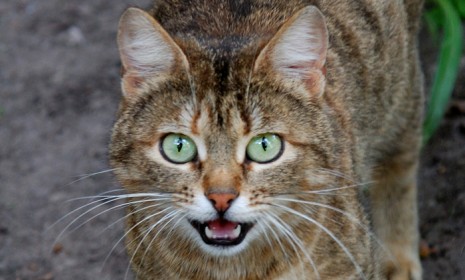Can cats make their owners schizophrenic?
A brain-infecting parasite residing in some litter boxes could put cat owners at risk of mental disorders

A free daily email with the biggest news stories of the day – and the best features from TheWeek.com
You are now subscribed
Your newsletter sign-up was successful
A temperamental feline can seem maddening. But a growing body of research suggests that a brain parasite idling in some litter boxes could really be leading unknowing cat owners to mental disorders, including bouts with schizophrenia. Kathleen McAuliffe says in this month's issue of The Atlantic that Toxoplasma gondii, commonly found in cat feces, could be infecting as many as a million people a year. Here, a brief guide:
Wait — a parasite in cat feces?
Yes. It's long been known that T. gondii is a "major threat" to people with weak immune systems, including the elderly and pregnant women, says Kathleen McAuliffe in The Atlantic. And "standard medical wisdom" stipulates that children and adults fighting off the microbe experience "nothing worse than brief flu-like symptoms." But mounting evidence suggests the parasite might have an effect on the neurology of even healthy adults.
The Week
Escape your echo chamber. Get the facts behind the news, plus analysis from multiple perspectives.

Sign up for The Week's Free Newsletters
From our morning news briefing to a weekly Good News Newsletter, get the best of The Week delivered directly to your inbox.
From our morning news briefing to a weekly Good News Newsletter, get the best of The Week delivered directly to your inbox.
What made scientists suspect the danger?
Jaroslav Flegr, a 63-year-old Czech scientist, spent over a decade researching what at first appeared to be a "jarringly unconventional" hypothesis: The single-celled organism had been "subtly manipulating his personality, causing him to behave in strange, often self-destructive ways." But now leading neuroscientists from around the world, including Stanford's Robert Sapolsky, think Flegr "could well be onto something."
What does the parasite do?
The evidence suggests that T. gondii "jacks up the dopamine receptors in your brain," says Charlie Jane Anders at io9, "which govern pleasure and fear responses." Flegr suggests that the parasite may be making infected people more reckless, playing a role "in hundreds of thousands of traffic fatalities," or even some suicides. Previous research has shown that "infected rats were more active and less cautious in areas where predators lurk," says The Atlantic's McAuliffe. In one experiment, infected rats were actually drawn to the smell of cats. In other words, says Frederick E. Allen at Forbes, the evidence suggests a growing connection "between the parasite and odd behavior" — which can sometimes be deadly.
A free daily email with the biggest news stories of the day – and the best features from TheWeek.com
How does it infiltrate the brain?
Humans can acquire the bug from the litterbox of a cat that has roamed around outside. But the parasite can also reside in drinking water contaminated with cat feces, unwashed vegetables, or even undercooked meat. (According to Flegr, the French can have infection rates as high as 55 percent thanks to their affinity for rare cuts of beef.)
Does that mean I have a parasite in my head?
Perhaps. But the odds suggest you'd be in the minority. Flegr estimates that 10 to 20 percent of Americans could have the parasite latched onto their brains. And indoor-only cats actually don't carry the parasite — it's only outdoor felines. That's good news, says Forbes' Allen. Plus, the effects of T. gondii might be benign in certain people.
How can I protect myself?
The parasite is only active in outdoor cats during their first three weeks of life, when their immune systems aren't fully developed. "During that brief period, Flegr simply recommends taking care to keep kitchen counters and tables wiped clean," says The Atlantic's McAuliffe. Stay away from drinking water that hasn't been properly purified, and clean vegetables thoroughly. This story "is repulsive and fascinating," says Sam Worley at the Chicago Reader. To think: "My cat might be the end of me."
Sources: The Atlantic, Chicago Reader, Forbes, io9
-
 Buddhist monks’ US walk for peace
Buddhist monks’ US walk for peaceUnder the Radar Crowds have turned out on the roads from California to Washington and ‘millions are finding hope in their journey’
-
 American universities are losing ground to their foreign counterparts
American universities are losing ground to their foreign counterpartsThe Explainer While Harvard is still near the top, other colleges have slipped
-
 How to navigate dating apps to find ‘the one’
How to navigate dating apps to find ‘the one’The Week Recommends Put an end to endless swiping and make real romantic connections